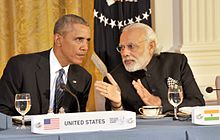2016 Nuclear Security Summit
| 2016 Nuclear Security Summit | |
|---|---|
 | |
| Host country | United States |
| Date | March 31 – April 1, 2016 |
| Venue(s) | Walter E. Washington Convention Center |
| Cities | Washington, D.C. |
| Participants | 58 representatives |
| Follows | 2014 Nuclear Security Summit |
| Website | www |
| Nuclear weapons |
|---|
 |
| Background |
| Nuclear-armed states |
|
The 2016 Nuclear Security Summit was a summit held in Washington, D.C., United States on March 31 and April 1, 2016. It was the fourth edition of the conference, succeeding the 2014 Nuclear Security Summit.
Background
[edit]This section needs expansion. You can help by adding to it. (March 2016) |
The 2016 Nuclear Security Summit[1] was held at the Walter E. Washington Convention Center in Washington, D.C., in the United States of America.[2]
Participants
[edit]

Notably absent from the summit were leaders or representatives of Russia, North Korea, Iran and Belarus.[3] However, a significant contingent of Asian leaders especially from South Asia such as India and Singapore attending the summit was a probable sign of continental concern over terrorist threats alongside vulnerable nuclear facilities.[4]
Announcements
[edit]
Various countries, including Kazakhstan and Poland, undertook to reduce their highly enriched uranium stockpiles. Japan agreed to ship additional separated plutonium to the U.S.[10] Canada pledged $42 million to bolster nuclear security.[11] The U.S. disclosed its own inventory of highly enriched uranium has dropped from 741 metric tons in the 1990s to 586 metric tons as of 2013. A strengthened nuclear security agreement, which had languished since 2005, was finally approved, extending safeguards for nuclear materials and requiring criminal penalties for nuclear smuggling.[12] According to the U.S., since the last summit in 2014, ten nations have removed or disposed of about 450 kilograms of highly enriched uranium; Argentina, Switzerland and Uzbekistan are now free of highly enriched uranium, as is all of Latin America and the Caribbean.[13]
The summit participants stated that the 2016 summit would be "the last of this kind".[12]
Three months after the meeting, NPCIL and Westinghouse agreed to conclude contractual arrangements for 6 reactors by June 2017.[14]
See also
[edit]References
[edit]- ^ "White House Press Call: Previewing the Nuclear Security Summit". Retrieved March 31, 2016.
- ^ "2016 Nuclear Security Summit". Retrieved March 31, 2016.
- ^ "ISIS threat raises stakes for US Nuclear Security Summit". AFP. March 30, 2016. Retrieved March 31, 2016.
- ^ Au Yong, Jeremy (March 28, 2016). "Close watch on nuclear security". Retrieved March 31, 2016.
- ^ "Participating Country and International Organization Delegations" (PDF). Retrieved March 31, 2016.
- ^ "PM Narendra Modi To Embark on 3-Nation Visit March End". NDTV. Retrieved February 29, 2016.
- ^ Au Yong, Jeremy (March 30, 2016). "PM Lee visits Sept 11 memorial in New York". Retrieved March 31, 2016.
- ^ "Nuclear Security Summit: What's at stake". AFP. March 30, 2016. Retrieved March 31, 2016.
- ^ "VN to join nuclear security summit". Retrieved March 30, 2016.
- ^ "Barack Obama's final attempt to safeguard nuclear stockpiles". The Economist. April 3, 2016. Retrieved April 2, 2016.
- ^ Matt Kwong (April 2, 2016). "Trudeau, Obama tout commitments at close of Nuclear Security Summit". CBC News. Retrieved April 3, 2016.
- ^ a b "World leaders urge action against terrorism at Nuclear Security Summit". PBS NewsHour. April 2, 2016. Retrieved April 3, 2016.
- ^ "Obama touts removal of highly enriched uranium". USA TODAY. April 2, 2016. Retrieved April 3, 2016.
- ^ "U.S. Firm to Build Six Nuclear Reactors in India". Wall Street Journal. June 7, 2016.
